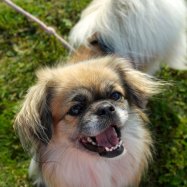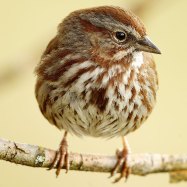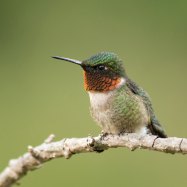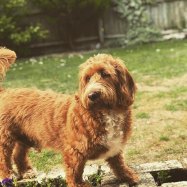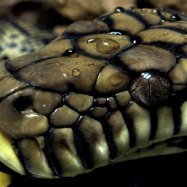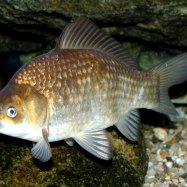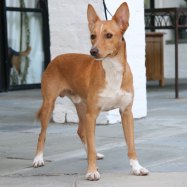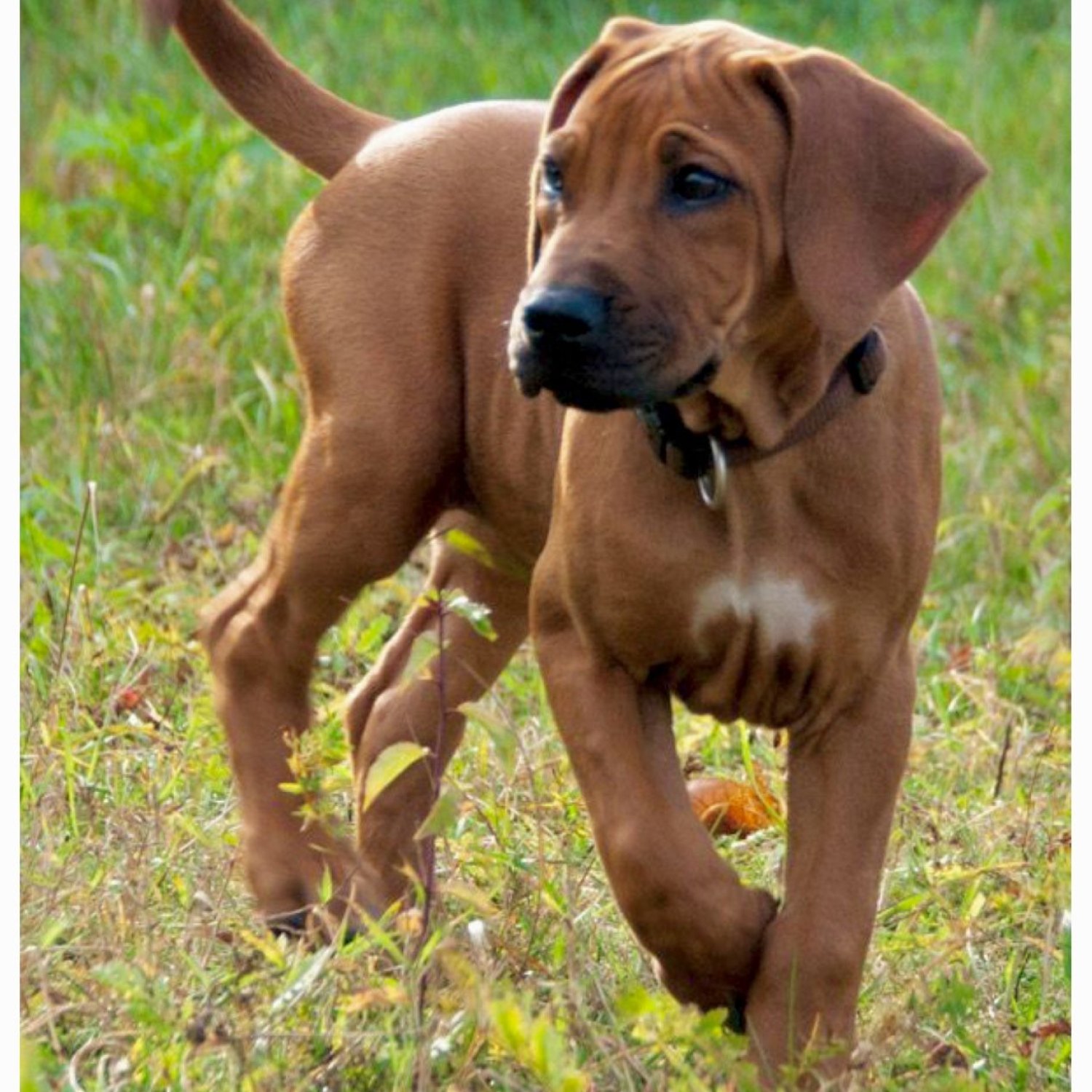
Rhodesian Ridgeback
24-27 inches (61-69 cm)
The Rhodesian Ridgeback, also known as the African Lion Hound, is a popular dog breed famous for its distinctive ridge of hair along its back. With a height of 24-27 inches and a muscular build, this breed is perfect for athletic owners. Originating in Africa, they can now be found in Asia, Europe, and the Americas, making them a well-traveled and versatile companion for any dog lover. #RhodesianRidgeback #AfricanLionHound #dogbreeds #Canidae
Animal Details Summary:
Common Name: Rhodesian Ridgeback
Kingdom: Animalia
Habitat: Grasslands, savannas, and woodlands
The Mighty Rhodesian Ridgeback: A Hunter's Companion
If you're a dog lover or an avid hunter, chances are you have heard of the Rhodesian Ridgeback. This majestic breed with a striking appearance and a strong hunting instinct has captured the hearts of many people around the world. But what makes this dog so special? Why is it often referred to as a hunter's companion? Let's dive deeper into the fascinating world of Rhodesian Ridgebacks and discover what makes them stand out in the dog kingdom.Scientifically known as Canis lupus familiaris, the Rhodesian Ridgeback is a member of the Canidae family, which includes wolves, foxes, and other dog breeds Rhodesian Ridgeback. It is believed that the Rhodesian Ridgeback originated from Southern Africa, specifically Zimbabwe, which was formerly known as Rhodesia. However, due to its versatility and adaptability, this breed can now be found all around the world, from Africa and Asia to Europe and the Americas.
Despite its widespread presence, the Rhodesian Ridgeback has kept its roots in Southern Africa, where it was originally bred by the Boer settlers for hunting purposes. These dogs were mainly used for tracking and holding down prey until the hunters arrived. They were also trained to be fearless protectors of their masters and their properties, making them the perfect companions for the harsh and unpredictable African wilderness.
As we delve into the physical characteristics of the Rhodesian Ridgeback, one feature stands out - its distinctive ridge of hair along the back. This ridge, which gives the breed its name, is formed by the hair growing in the opposite direction from the rest of the coat. As a result, the hair along the spine forms a narrow strip of backward-growing hair, giving the ridge a defined and symmetrical appearance. The coloration of this ridge varies, ranging from black to red or even blonde, but it is typically lighter than the rest of the coat Rough Legged Hawk.
Speaking of coat color, Rhodesian Ridgebacks can have a variety of shades, depending on their ancestral lineage. However, the most common color is a light to reddish-brown coat, often described as "wheaten." This coat color serves as excellent camouflage for the dog in the savannas and woodlands where it hunts. In addition, the coat is short and dense, providing protection from the harsh sun and heat of Africa.
But what really sets the Rhodesian Ridgeback apart is its athletic and muscular body shape. With an average length of 24-27 inches and a weight of 70-85 pounds, this breed may seem intimidating to some. However, don't let its size fool you! The Rhodesian Ridgeback is a gentle and loyal companion, especially towards its human family. But when it comes to its hunting instincts, this dog is a force to be reckoned with.
Being part of the Carnivora order, it's no surprise that Rhodesian Ridgebacks have a carnivorous feeding method. In their natural habitat, these dogs feed on small prey such as rodents, birds, and even insects. However, when trained for hunting, they can take down larger animals like antelopes, warthogs, and even lions. This impressive prey selection makes them an ideal hunting partner for humans.
Since their main habitat is the African savannas and grasslands, Rhodesian Ridgebacks are well-suited to hot and dry environments. They have a high tolerance for heat and can easily withstand long periods of exposure to the sun. However, proper care and attention must be given to their physical well-being, such as providing enough water and shade, especially during hot summer days.
To survive in the African wilderness, these dogs have also developed exceptional endurance, strength, and agility. They are known for their confident and independent nature, which enables them to take on long and challenging hunts without giving up. In addition, their instinct to protect their territory and family makes them incredibly loyal and fearless, making them excellent guard dogs.
But don't let their independent nature fool you into thinking they can't be trained. Rhodesian Ridgebacks are highly intelligent and can be easily trained, given the right motivation and consistency. They thrive on praise and positive reinforcement, making them ideal for activities such as obedience training and agility courses. However, early socialization and proper training are essential for them to reach their full potential.
As their popularity grew, Rhodesian Ridgebacks also caught the attention of European hunters who were drawn to their exceptional hunting abilities and striking appearance. Soon, these dogs made their way to Europe, and by the 1930s, they were being used for small and big game hunting. Their versatility and adaptability to different environments allowed them to excel in various hunting tasks, making them a valuable asset for hunters.
Today, the Rhodesian Ridgeback has a strong presence in many countries worldwide, and its popularity continues to grow. However, being a highly specialized breed, this dog may not be the ideal companion for everyone. Its strong hunting instinct and independence require proper training and a dedicated owner who can provide it with daily physical and mental stimulation.
In addition to their hunting skills, Rhodesian Ridgebacks are also popular for their calm and loyal demeanor, making them great family dogs. Their gentle natures make them well-suited for homes with children, and their protective instincts make them excellent watchdogs. However, because of their size and strength, they should always be supervised when interacting with small children.
In conclusion, the Rhodesian Ridgeback truly lives up to its nickname as a "hunter's companion." With its strong hunting instinct, impressive physical characteristics, and loyal nature, this breed has been a reliable and valued partner for hunters for centuries. And while their popularity continues to soar, it's essential to remember that these dogs still have their roots in the African savannas and should be respected and cared for accordingly.
So, whether you're a avid hunter looking for a loyal companion or a dog lover fascinated by the legendary Rhodesian Ridgeback, one thing is for sure - this breed will capture your heart with its grace, courage, and intelligence. And as you embark on adventures together, you'll discover just how mighty and truly extraordinary this dog can be. The Rhodesian Ridgeback is not just a dog; it's a hunter's companion, and a truly remarkable one at that.

Rhodesian Ridgeback
Animal Details Rhodesian Ridgeback - Scientific Name: Canis lupus familiaris
- Category: Animals R
- Scientific Name: Canis lupus familiaris
- Common Name: Rhodesian Ridgeback
- Kingdom: Animalia
- Phylum: Chordata
- Class: Mammalia
- Order: Carnivora
- Family: Canidae
- Habitat: Grasslands, savannas, and woodlands
- Feeding Method: Carnivorous
- Geographical Distribution: Originally from Southern Africa, now found worldwide
- Country of Origin: Zimbabwe (formerly known as Rhodesia)
- Location: Africa, Asia, Europe, Americas
- Animal Coloration: Varies, typically light to reddish-brown coat with a distinctive ridge of hair along the back
- Body Shape: Athletic and muscular
- Length: 24-27 inches (61-69 cm)
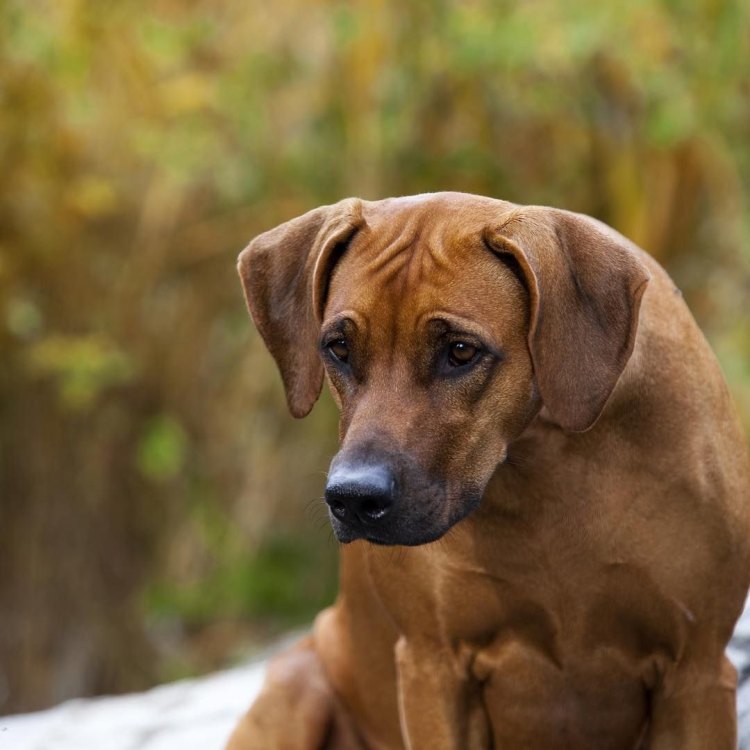
Rhodesian Ridgeback
- Adult Size: Large
- Average Lifespan: 10-12 years
- Reproduction: Sexual
- Reproductive Behavior: Seasonal breeding
- Sound or Call: Barks, growls, and howls
- Migration Pattern: Non-migratory
- Social Groups: Pack-oriented
- Behavior: Loyal, affectionate, intelligent, and protective
- Threats: No major threats
- Conservation Status: Not listed
- Impact on Ecosystem: N/A
- Human Use: Companion dog, hunting dog
- Distinctive Features: Ridge of hair along the back
- Interesting Facts: Rhodesian Ridgebacks were bred in Southern Africa for hunting large game such as lions. They have a distinctive ridge of hair along their back, which grows in the opposite direction to the rest of their coat.
- Predator: No major predators
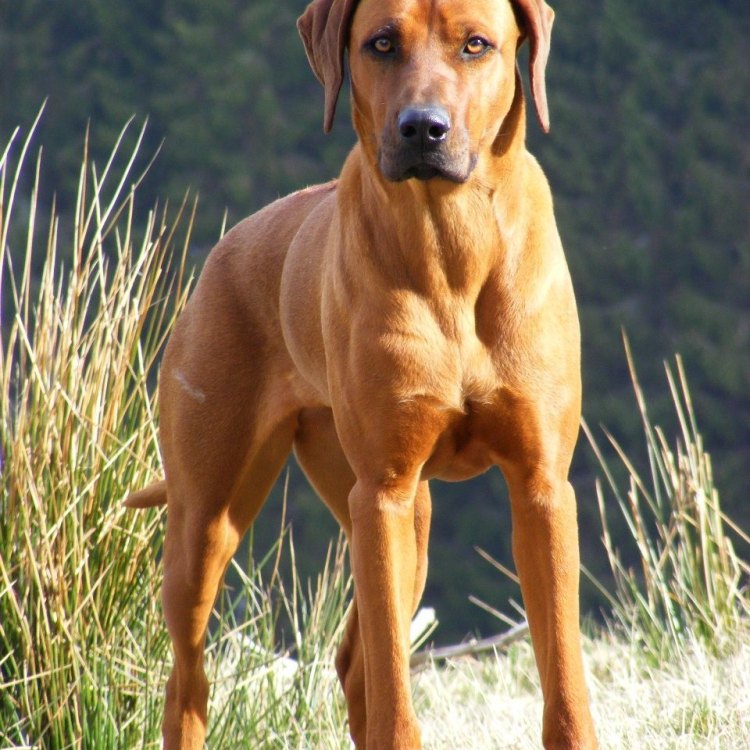
Canis lupus familiaris
The Noble Hunter: A Closer Look at the Rhodesian Ridgeback
In the vast world of dog breeds, there are countless fascinating and unique features that separate each one from the other. One breed that stands out is the Rhodesian Ridgeback, a large and loyal dog that has gained popularity among dog lovers worldwide. Known for their distinctive ridge of hair along their back, these dogs have a rich history and interesting characteristics that make them stand out from the rest. In this article, we will delve deeper into what makes Rhodesian Ridgebacks so special and why they make such beloved companions PeaceOfAnimals.Com.A Big Dog with a Big Heart
The Rhodesian Ridgeback is classified as a large breed, typically standing at 24-27 inches at the shoulder and weighing between 70-85 pounds. This size makes them a suitable choice for owners who prefer a bigger, more robust dog. They have a muscular and athletic build, reflecting their history as skilled hunters. Despite their size, Rhodesian Ridgebacks are known to be gentle and affectionate companions, making them great family dogs.A Long and Loyal Lifespan
On average, a Rhodesian Ridgeback can live between 10-12 years, which is a relatively long lifespan for a large breed. With proper care and nutrition, they can live even longer, making them excellent lifelong companions for their owners. This also means that investing in a Rhodesian Ridgeback is a long-term commitment, as they will be a part of your family for years to come.Reproduction and Breeding Behavior
Like most mammals, Rhodesian Ridgebacks reproduce sexually, with males and females coming together to mate and produce offspring. However, what makes their reproductive behavior unique is their seasonal breeding Red Star Chicken. Unlike some breeds that can have two or more heat cycles per year, female Rhodesian Ridgebacks only have one heat cycle annually, usually in the fall. This means that owners who wish to breed their Ridgebacks need to plan accordingly and be aware of the limited breeding window.Sounds of the Wild: Communication through Barks, Growls, and Howls
Communication is essential for any social being, and dogs are no exception. Rhodesian Ridgebacks have a wide range of vocalizations, including barks, growls, and howls, to communicate with each other and their owners. Barks are used to alert their human companions of potential threats or visitors, while growls can be a sign of discomfort or warning. Howls are often associated with loneliness or frustration and can also be used to communicate with other dogs over long distances.Staying Put: Non-Migratory Migration Pattern
Many species of animals have a migratory pattern, where they move from one place to another in search of food, shelter, or breeding grounds. However, Rhodesian Ridgebacks are non-migratory, meaning they do not undertake any long-distance journeys and generally stay put in their home territory. This makes them excellent companions for owners who prefer a dog that will stick around and not wander off.Pack-oriented Social Groups
In the wild, dogs are pack animals that live, hunt, and socialize together. The same holds true for domesticated dogs, including Rhodesian Ridgebacks. These dogs have a strong pack-oriented social structure and tend to form a close-knit group with their owners and other dogs in the household. This makes them a perfect choice for those who are looking for a companion that will become a loyal member of the family.The Perfect Balance: Loyal, Intelligent, and Protective
The Rhodesian Ridgeback has gained popularity among dog lovers for their unique blend of traits. They are known for their unwavering loyalty, intelligence, and protective nature, making them ideal companions for families. These dogs are incredibly affectionate and bond closely with their owners, making them highly attuned to their emotions and needs. They are also intelligent, making them easy to train and great for tasks such as hunting and search and rescue.The Not-So-Threatening Threats
One of the most significant concerns for animal enthusiasts is the conservation status of a particular species. However, there are no major threats to Rhodesian Ridgebacks, and they are not listed as endangered or vulnerable. As a domesticated dog breed, they do not face any severe threats in their natural environment. However, like any other dog, they are susceptible to certain health issues, such as hip dysplasia and elbow dysplasia, which owners should be aware of and take preventative measures for.Hunting, Companionship, and Beyond: The Impact of Rhodesian Ridgebacks on Humans
The Rhodesian Ridgeback was originally bred in Southern Africa during the 16th century for hunting large game, including lions and wild boar. Their unique ridge of hair along their back was believed to be a mark of courage and strength, making them fit for the hunt. However, as years went by, they were also trained and used as guard dogs and as companions for families. Their fierce loyalty and protective nature make them excellent guard dogs, while their loving and affectionate demeanor makes them perfect family pets.Rhodesian Ridgebacks: The Perfect Blend of Beauty and Brains
One of the most distinctive features of a Rhodesian Ridgeback is the ridge of hair along their back. This ridge, which runs in the opposite direction to the rest of their coat, is what gives them their name and makes them stand out from other breeds. The ridge is caused by a genetic mutation, making it a unique and desirable characteristic among breeders and owners. But apart from their physical appearance, Rhodesian Ridgebacks are also known for their sharp minds and quick thinking, making them highly capable hunting and guard dogs.Unchallenged by Predators
In the wild, predators are a constant threat to many animals. However, Rhodesian Ridgebacks do not face any major predators, either in their natural habitat or in domestic settings. Their large size and protective nature make them a formidable opponent for any potential threat, making them an ideal choice for guarding and protecting their owners and their homes.A Breed Apart: The Rhodesian Ridgeback
In conclusion, the Rhodesian Ridgeback is a remarkable breed with a rich history, fascinating traits, and a significant impact on humans. Their distinctive appearance, paired with their loyal, affectionate, and protective nature, makes them a popular choice for many dog owners. Whether you are looking for a hunting dog, guard dog, or family companion, the Rhodesian Ridgeback is a breed that is sure to capture your heart and make a lasting impression. So if you are considering adding a four-legged companion to your life, look no further than the noble and majestic Rhodesian Ridgeback.
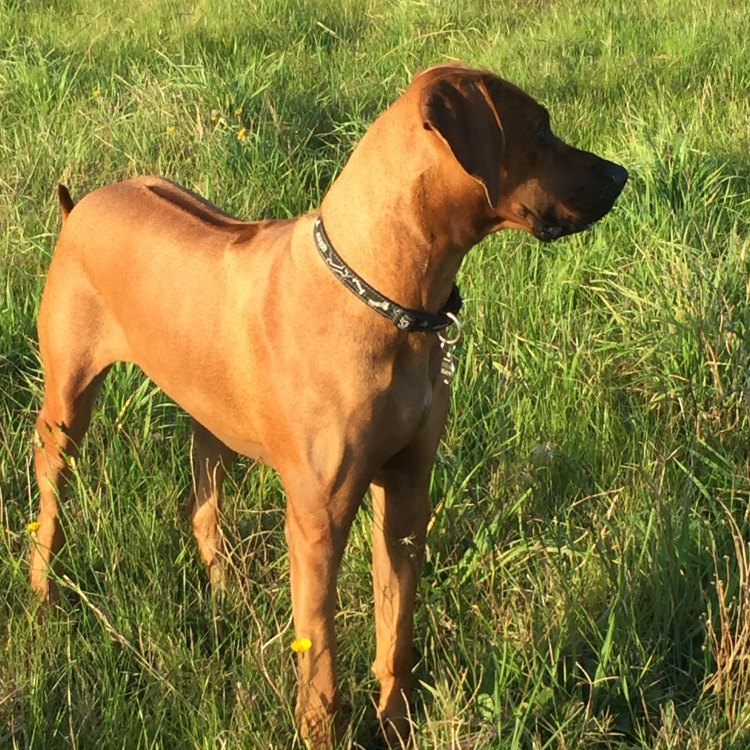
The Mighty Rhodesian Ridgeback: A Hunter's Companion
Disclaimer: The content provided is for informational purposes only. We cannot guarantee the accuracy of the information on this page 100%. All information provided here may change without prior notice.

